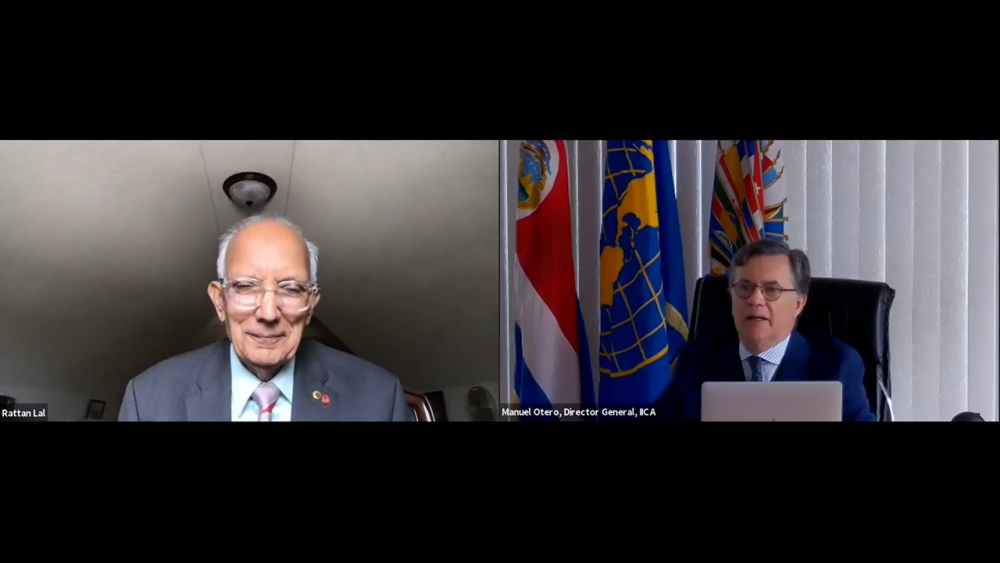The 2020 World Food Prize winner appeals for sustainable soil management to boost agricultural productivity

San Jose, July 2020 (IICA). Rattan Lal, winner of the 2020 World Food Prize, advocated for an increasingly efficient agriculture sector, capable of producing more with less, while remaining in harmony with the environment – something that, to a great extent, will depend on preserving soil health.
Lal, who is considered one of the most influential scientific minds in the world, had an online discussion with Manuel Otero, Director General of the Inter-American Institute for Cooperation on Agriculture (IICA), in one in a series of high-level meetings organized by the Institute to assess the impact of Covid-19 on food security matters.
In the discussions—focusing on soil management and sustainable development—the distinguished university professor in Soil Sciences, who is also Director of the Carbon Management and Sequestration Center of Ohio State University, explained that this natural resource relates closely to the Sustainable Development Goals (SDGs) and is key to their achievement, namely the goals that target no poverty, zero hunger, good health and well-being, clean water and sanitation, climate action, and finally, life on land.
“Soil health is intricately linked to human health and well-being. This relationship tells us that the SDGs and the health of soils and organic matter are all connected. Soil health and human health depend on nutrition and the quality of food that is produced”, said Rattan, who has authored 22 books and almost 1,000 articles in scientific magazines.
Otero agreed that, “Soil health considerations are key to the future of humanity”, and that this message must be conveyed to small farmers, while offering them the necessary technical cooperation to promote the restoration of agricultural soils and the introduction of more pragmatic and holistic production models.
The World Food laureate also explained that soil health also plays a part in food nutrition, emphasizing that Latin America and the Caribbean should focus on solving problems such as the degradation and erosion of arable land.
He pointed out that, “Degradation of the land of small farmers not only affects the productivity and income of their farms, but also influences the nutrition quality of the foods they produce”.
“Soil erosion is a problem in Latin America”, he stressed, affecting 20% of soils in the region, particularly in Central America. Desertification affects 17% of soils in Colombia, 28% in Ecuador and 62% in Chile, and is also prevalent in Northeast Brazil. Salinization is a serious concern, most notably in the pampas and other parts of Argentina, as well as in Peru and other arid areas”.
Rattan also highlighted the importance of organic matter to soil, which, when produced, allows farmers to reduce the use of pesticides and synthetic fertilizers. He recalled the role of soils in carbon sequestration and discussed agriculture’s major role in reducing greenhouse gas emissions, which the world hopes to reduce to net-zero emissions by 2050.
“We must envision an agriculture sector that combines the cultivation of different crops with trees and cattle rearing, adopting practices that assist the soils in regulating disease, while creating an efficient integrated system of nutrient management. We must learn to produce more with less chemicals. By reducing the use of pesticides and chemical fertilizers, we can improve soil health and the organic content of soils”, he said.
Lal insisted that, “Agriculture cannot be a problem; it must be part of the solution to combat climate change because we cannot survive without it. The region has enormous potential, that lies in the carbon absorption potential of its plants and the ability to reduce agricultural emissions. Central America and South America have reduced their emissions per unit of production. This is an excellent indication of cultivation exceeding cattle production, but the region must continue working on that and this is where IICA has a key role to play”.
The scientist, whose work has concentrated on the soil’s potential in helping to resolve global problems, such as climate change, food security and water quality, reflected on the importance of promoting sustainable agriculture, supporting farmers in translating science into action and demonstrating that the health and well-being of humans goes hand in hand with the health of soils and nature. They are one.
In concluding Rattan remarked that, “We must support farmers in caring for the land. We must empower male and female farmers, as many of them are women. Many women are farmers.”
More information:
Institutional Communication Division, IICA.
comunicacion.institucional@iica.int